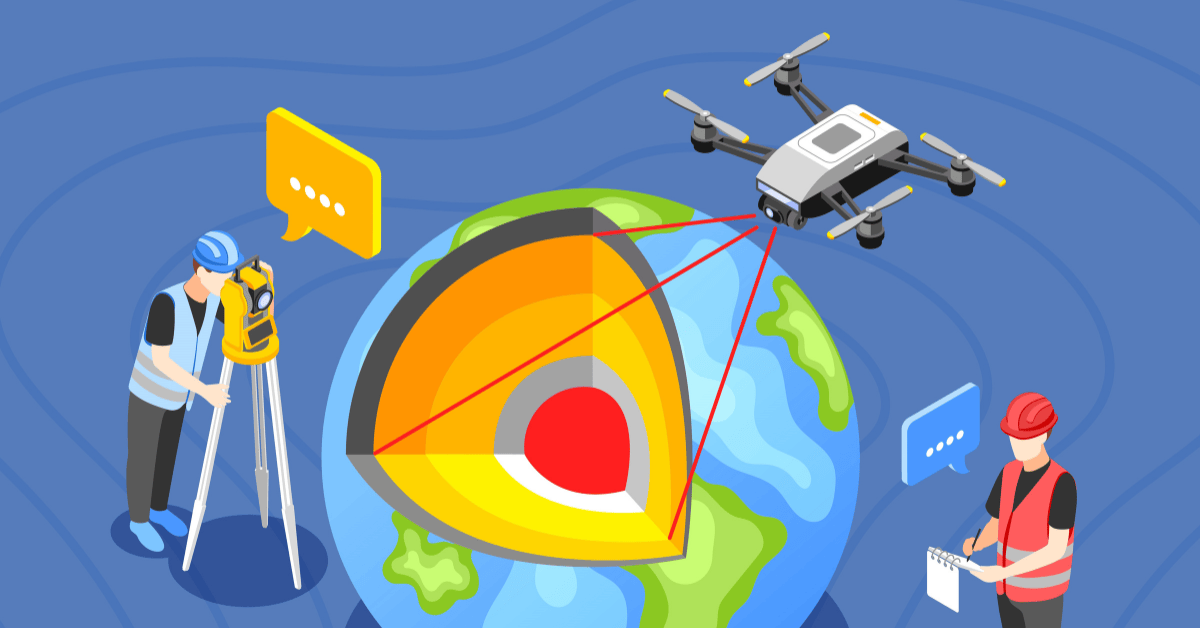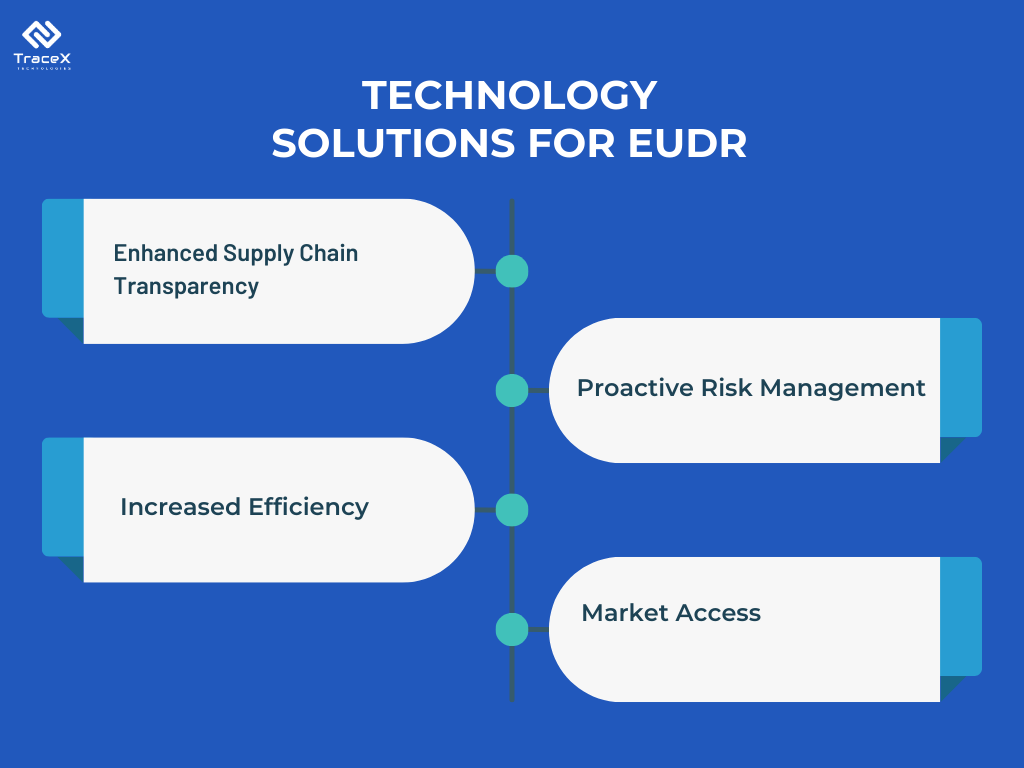Contact: +91 99725 24322 |
Menu
Menu
Quick summary: Discover how EUDR solutions use AI, satellite data, and blockchain to help businesses meet EU deforestation regulations with traceable, compliant supply chains.

EUDR solutions use advanced technologies like satellite monitoring, geolocation, and blockchain to ensure compliance with the EU Deforestation Regulation (EUDR). These tools help companies trace supply chains, verify deforestation-free sourcing, and generate due diligence reports required by law. By integrating real-time data and AI, businesses can proactively manage risk and meet EU standards efficiently. According to the European Commission, these digital tools are essential for achieving transparency and sustainability in global supply chains (European Commission, 2023).
The EU Deforestation Regulation (EU Regulation 2023/1115) mandates that companies placing certain products on the EU market must prove they are deforestation-free and legally sourced. This law targets commodities like soy, palm oil, beef, cocoa, wood, and coffee, requiring full supply chain traceability back to the plot of land.
Non-compliance carries high stakes: fines, confiscated goods, and restricted market access.
EUDR solutions harness geolocation tech, satellite imagery, and AI-driven risk assessments to automate due diligence, verify origins, and flag non-compliant suppliers—transforming compliance into an efficient, data-driven process.
Key takeaways
Meeting the demands of EU Regulation 2023/1115 requires more than scattered tools—it demands an interconnected digital ecosystem. These core technologies are not just support systems; they are the operational backbone of EUDR compliance in a world where transparency is currency.
EUDR solutions use real-time and historical satellite data—Sentinel-2 (Copernicus), Landsat, Planet Labs—to map forest cover, track land-use change, and flag illegal deforestation before goods reach the port. This proactive intelligence allows businesses to screen plots pre-purchase, not just post-shipment.
These tools shift companies from reactive compliance to predictive enforcement—empowering procurement teams to act as early warning systems, not last-line checkers.
Blockchain provides a tamper-proof digital ledger that tracks inputs, plot geolocation, and ownership data across each supply chain node. Unlike spreadsheets or PDFs, it guarantees data continuity—from smallholder farms to EU customs.
In regions with fragmented or corrupt land registries, blockchain becomes a parallel legal system—trusted not just by importers, but by regulators and financial institutions funding deforestation-free trade.
GPS-enabled devices, drones, and mobile field apps enable in-field agents to map farm boundaries (point or polygon), capture KYC data, and upload geotagged photos—even offline. Integration with government registries ensures alignment with national land-use records.
These tools democratize compliance—giving visibility into thousands of micro-suppliers who were previously “off-grid.” It makes EUDR not just enforceable, but inclusive.
AI models analyze deforestation risk, flag dubious supplier behavior, and even auto-fill Due Diligence Statements with plot-level coordinates, EORI numbers, HS codes, and legal references.
Agentic AI transforms DDS creation from a manual bottleneck to a real-time compliance flow—allowing teams to scale operations across continents without scaling risk.
Unified platforms combine satellite layers, supplier profiles, blockchain trails, and DDS data in one role-based interface. With built-in compatibility for EU TRACES and FSC systems, these platforms serve as the operational hub for regulatory reporting and audit readiness.
These aren’t just software solutions—they are compliance operating systems. Companies that adopt them gain resilience not only for EUDR, but for emerging ESG and CBAM frameworks.
Modern EUDR solutions offer robust API integrations that connect directly to internal ERP systems (SAP, Oracle, Microsoft Dynamics, etc.) and external regulatory platforms like EU TRACES. These integrations allow real-time data sync between procurement, inventory, logistics, and compliance workflows—eliminating manual data entry, reducing errors, and ensuring every DDS is filed with up-to-date, verified information.
API integration transforms EUDR compliance from a parallel process into an embedded feature of daily operations. It future-proofs businesses by ensuring that compliance scales with growth—no extra overhead, no siloed systems, just seamless interoperability from source to port.
Technology isn’t just supporting EUDR compliance—it’s redefining it. The most successful exporters and importers will treat these tools not as cost centers, but as strategic infrastructure for climate-proof, regulation-ready trade.
Want a step-by-step guide to mastering EUDR compliance?
How can satellites help you stay deforestation-free?
Complying with the EUDR isn’t just about ticking regulatory boxes—it’s about building transparent, tech-enabled supply chains that can stand up to forensic-level scrutiny.
Where older regulations accepted aggregated reports, the EUDR expects a “data twin” of the supply chain—complete, timestamped, and continuously verifiable. Businesses that treat compliance as a dynamic digital discipline—not a retroactive reporting task—will be the ones that adapt, scale, and lead in a zero-deforestation economy.

Selecting the right EUDR solution provider is critical—not just for compliance, but for future-proofing your supply chain. The right platform should do more than check regulatory boxes; it should offer scalability, interoperability, and real-world usability, especially in fragmented sourcing environments. Here’s how to evaluate a provider, and why TraceX EUDR Compliance Platform leads in this space:
Discover how a leading Nigerian trading firm used the TraceX EUDR Platform to streamline supplier onboarding, validate geolocation data, and submit DDS with confidence.
Read the case study

TraceX leverages agentic AI to automate and enhance every stage of the EUDR compliance journey—starting with hassle-free supplier onboarding. Suppliers can be onboarded via email invites, with AI-powered document parsers and invoice data extractors automatically capturing KYC, land tenure, and sourcing details. The platform uses AI to validate and correct polygon geometries, ensuring accurate plot-level mapping compliant with EUDR standards. Built-in AI risk scoring flags potential non-compliance based on deforestation alerts, legal discrepancies, or missing documentation. TraceX continuously updates regulatory logic in sync with EU policy changes and tech standards, ensuring businesses stay compliant without manual intervention. Combined with workflow automation, open API integrations, and real-time syncing with ERP and EU TRACES systems, TraceX transforms EUDR compliance into a seamless, intelligent, and scalable process.
In a regulatory landscape shaped by climate urgency and supply chain complexity, compliance alone is no longer enough. Businesses must go beyond meeting EUDR requirements—they need to decarbonize operations, de-risk sourcing, and deliver full traceability at scale.
Agentic AI-powered platforms like TraceX are making this shift possible by turning compliance into a catalyst for broader sustainability goals. From real-time deforestation alerts and auto-filled DDS forms to verifiable carbon baselines and smallholder integration, these tools create a digital foundation for resilient, transparent, and responsible trade.
Whether you’re a compliance lead or a tech integrator, these insights will help you build a smarter, audit-ready supply chain.
How blockchain ensures traceability
How EUDR APIs streamline DDS submissions and ERP syncs.
An EUDR solution is a digital platform that helps businesses comply with the EU Deforestation Regulation by automating due diligence, tracking geolocation data, and ensuring traceability across supply chains.
Technologies like satellite monitoring, blockchain, AI, and ERP integrations enable businesses to validate land use, score supplier risk, generate compliant DDS forms, and ensure end-to-end transparency.
Satellite imagery verifies that sourcing plots are deforestation-free post-2020, helping businesses prove land legality and detect non-compliant suppliers before products reach the EU market.
